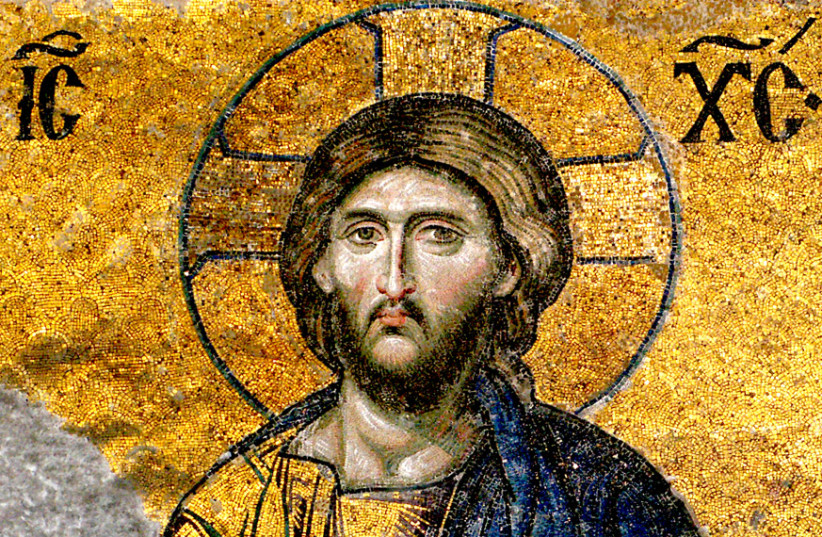With Christmas bells a’ringing and billions soon to begin their celebrations, Jesus, a Jew, would be in for a real surprise (and identity crisis) to hear guests on his birthday claiming that he was from Palestine, a term he might have never encountered during his lifetime. Nevertheless, it’s that time of year; when like clockwork, some pro-Palestinian activists have again begun unleashing social media posts claiming that Jesus – born in Bethlehem – was a Palestinian.
In reality, Jesus was a proud, observant Jew who lived in his indigenous homeland of Judea and Galilee – from manger to grave. The myth that Jesus was Palestinian, a ploy designed to invite Christians to support Palestinian nationalism, often morphs into deliberate efforts to deny Jews their history, indigeneity, and right to sovereignty in Israel. Ironically, as Jews seek to combat rising antisemitism, now might be a good time to set the record straight on Christianity’s most important figure.
According to Christian sources, Jesus was born a Jew and he lived in a Jewish kingdom located in much of modern Israel, where Jews have now lived consecutively for 3,000 years. His disciple Luke noted that like all other Jewish boys, Jesus was circumcised on the eighth day (Luke 2:21) and later attended synagogue (Luke 4:16). According to Mark, Jesus was referred to as a rabbi (Mark 10:51); and per Matthew, Jesus’s last meal was a Passover seder (Matthew 26:17).
Importantly, Jesus hailed from the Jewish kingdom of Judea (also known as Judah), “the southern province of [historic] Israel.” Matthew painstakingly detailed that Jesus was “born in Bethlehem in Judea” (Matthew 2:1) and that he preached throughout Galilee and Judea (Matthew 19:1).
Jesus also surely prayed as a Jew at the Temple in Jerusalem, which he referred to as a “house of prayer” when citing Isaiah, according to Matthew 21:13.

Unsurprisingly, “Palestine” is never referenced in the New Testament, according to Middle Eastern historian Bernard Lewis. That is because during Jesus’s lifetime, “Palestine” never existed.
Trying to erase Jewish connections to the land
The term Palestine derives from Philistia after the land of the Philistines, a people originally from the Aegean coastline (modern-day Greece and Turkey). Goliath was defeated and the Philistines disappeared centuries before Jesus was born. After Imperial Rome defeated the third Jewish uprising, Roman forces massacred and expelled massive numbers of Jews from Judea and renamed it: Syria Palaestina. This was in 135 CE, over a century after Jesus’s death (sometime around 27-33 CE).
The new name was “to minimize Jewish identification with the land” and punish the rebellious Jews by naming the country after their biblical enemies.
As evidenced by the Romans, the erasure of Jewish memory, identity, and culture from Israel has become a mainstay tactic for antisemites over millennia.
What would Jesus now say about Palestinian-American “activists” such as comedian Amer Zaher, BDS supporter Linda Sarsour, and even Palestinian Authority President Mahmoud Abbas, who in recent years have depicted Jesus as “Palestinian?”
Speculation abounds, but the motive for Jewish erasure deserves quick mention, given its dangerous implications.
In October 2023, Hamas terrorists invaded Israel, massacring 1,200 people. Hamas’s charter clearly seeks to distort and deny Jewish history in Israel, presenting Jews as foreign colonizers.
The Hamas charter notes: “In the face of the Jews’ usurpation of Palestine, it is compulsory that the banner of Jihad be raised... With their [the Jews] money they were able to control imperialistic countries and instigate them to colonize many countries...”
This erasure of Jewish history is also a key element in the Palestinian Liberation Organization’s National Charter, which observes, “claims of historical or religious ties of Jews with Palestine are incompatible with the facts of history...”
Abbas rejects Jewish ties to the Jewish people’s holiest site, the Temple Mount, whose custodians, the Wakf, stand accused of having “deliberately” tried “to obliterate evidence of Jewish history” when it conducted excavations beyond its mandate on the Temple Mount in 1996.
Understanding this denial of Jesus’s Jewishness is therefore crucial for understanding global anti-Israel misinformation and antisemitism. As a victim of antisemitism, Jesus likely would have been confused, and perhaps insulted, to be portrayed as Palestinian, an identity whose etymological roots were sowed by the very empire – the Romans – whose soldiers subjected him to antisemitic abuse before crucifying him. “Hail, king of the Jews!” the Romans said, before slapping him (John 19:03).
As a Jew with a ministry in Judea (a region including parts of today’s West Bank), Jesus, if alive today in similar circumstances, might have even been rejected by some anti-Israel activists as a “foreign” settler. Such an accusation surely would have also confused Jesus.
However, when history is politically inconvenient, sometimes truth hardly matters. The ahistorical myth that Jesus was a Palestinian is often rooted in nationalist propaganda designed to erase Jewish history and memory, a centuries-old system of anti-Jewish oppression. For the sake of preserving intellectual honesty and historical integrity while rejecting anti-Jewish narratives, one must not only restore Jesus’s Jewish identity and indigeneity but dispel once and for all the claim that “Jesus was Palestinian.”
The writer is the director of policy education at StandWithUs, an international education organization devoted to combating antisemitism and misinformation about Israel.
